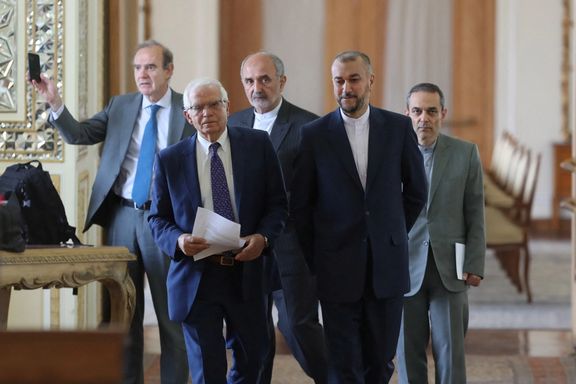With Iran Talks On Ice, Might UN Assembly Bring Discrete Contacts?

Contacts over reviving the 2015 Iran nuclear deal seem set to focus on next week’s United Nations General Assembly, when lead negotiators will be in New York.

Contacts over reviving the 2015 Iran nuclear deal seem set to focus on next week’s United Nations General Assembly, when lead negotiators will be in New York.
As Joseph Borrell Wednesday said negotiations were in a “stalemate,” two thirds of the International Atomic Energy Agency’s 35-nation member board signed a statement by the United States and three European states (France, Germany and the United Kingdom; the ‘E3’) pressing Tehran to satisfy the agency over unexplained uranium traces.
The statement, presented by Germany, called on Iran to “act immediately to fulfil its legal obligations.” Iran’s foreign affairs spokesman Nasser Kanaani said Thursday the move was “not constructive.”
The decision by the US and E3 not to raise a further resolution, following one passed in June, reflects their sense that success remains possible in talks to revive the 2015 agreement, the JCPOA (Joint Comprehensive Plan of Action). They may also judge that referring Iran from the IAEA board to the United Nations Security Council would achieve little and merely rile Tehran.
Wang Chang, deputy head of China’s IAEA mission, told the IAEA board Tuesday that with JCPOA talks resting on finding a solution to the ‘safeguards’ issue of the uranium traces, it was important to maintain perspective.
“Iran’s outstanding safeguards issues point to possible nuclear activities that took place decades ago, if at all,” Wang said. “There is neither urgency nor proliferation risk involved. Besides, the issue of the possible military dimensions of Iran’s nuclear program was already concluded in 2015.”
Outlining the US approach, State Department spokesman Ned Price said Tuesday Washington had sent feedback on the latest Iranian input after a European Union text, designed to conclude 18-month talks, was circulated August 8. While Price described the Iranian input as “a step backwards in many ways,” he said it was “not too late to conclude a deal.”

In his remarks Wednesday, Borrell explained the current stalemate in terms of “the political situation in the US” and “so many [other] directions.” Some analysts argue President Joe Biden is wary of restoring the JCPOA before November 8 US Congressional elections, where the Democrats aim to retain control of the Senate and fear Iran emerging as a contentious issue in tightly-fought states.
Negotiators in New York
While no meetings on the JCPOA have been announced for the September 20-24 UN General Assembly, it is likely that Ali Bagheri Kani, Iran’s lead nuclear negotiator, Rob Malley, the White House special Iran envoy for Iran, and Enrique Mora, the senior EU official co-ordinating JCPOA talks, will all be in New York. President Ebrahim Raisi is also due to attend.
The UN’s general debate will offer not just opportunities for speeches aimed at world opinion but opportunities, some analysts suggest, for discrete discussions. United Nations Secretary-General Antonio Guterres Tuesday called for Iran to accept “serious dialogue” over JCPOA restoration.
An official with Prime Minister Yair Lapid in Germany said Monday that the JCPOA was dead, whereas Defense Minister Benny Gantz said Wednesday it was in “the ER room.”
JCPOA critic: ‘Iran is winning’
Gantz, like Borrell, referenced US domestic politics: “There’s a period maybe after the elections, we’ll see how it goes.” US officials talking to journalist Laura Rozen have played down what they see as Israeli attempt to scuttle JCPOA talks with Israeli elections due November 1.
US opponents of the JCPOA have also continued efforts. Congresspeople raised a motion in the House Wednesday that Biden disclose any documents on the nuclear talks. Senator Ted Cruz has proposed legislation banning Raisi from the US.
Richard Goldberg, senior adviser at the Federation for Defense of Democracies, tweeted Thursday a call for “snapback UN sanctions now” as Iran was “winning” – although the US, outside the JCPOA since 2018, cannot trigger ‘snapback’ sanctions against Iran over exceeding the deal’s nuclear limits.
Michael Rubin, Senior Fellow at the American Enterprise Institute, wrote Monday that talks should be paused and US sanctions maintained due to “rumors that Iran’s Supreme Leader Ali Khamenei is on his deathbed.” Rubin has long argued against any talks with Tehran.